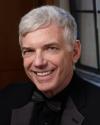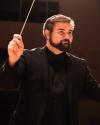Members of the UW Wind Ensemble (Timothy Salzman, director) perform music arranged for small ensembles, including works by Kamilló Lendvay, David Biedenbender, Antonín Dvořák, Roberto Sierra, Eugène Bozza, Karl King, David Maslanka, Ludwig van Beethoven, Florent Schmitt, and others. With graduate conductors Shaun Day, Corey Jahlas, and Roger Wu Fu.
Program Detail
Roberto Sierra (b.1953): Fanfarria (2000)
Shaun Day, conductor
Eugène Bozza (1905-1991): Jour D'Été À La Montagne (1955)
I. Pastorale
IV. Rondo
Flute Quartet
Karl King (1891-1971): Barnum and Bailey's Favorite
Tuba Ensemble
Antonín Dvořák (1841-1904): Serenade in D minor (1878)
I. Moderato, quasi marcia
II. Minuetto
IV. Allegro molto
Roger Wu Fu, conductor
David Maslanka (1943-2017): Mountain Roads (1997)
I. Overture
Saxophone Quartet
Paul Dukas (1865-1935) (arr. Johnston): The Sorcerer’s Apprentice (1897)
Clarinet Choir with Baritone Saxophone
Florent Schmitt (1870-1958): Lied et Scherzo
Anna Perry, horn
Intermission
David Marlatt (b. 1974): Spring: A New Beginning (2008)
I. The Call to Spring
II. The Celebration of Spring
Trumpet Ensemble
David Biedenbender (b. 1984) (arr. Tyler Austin): Kyrie (for Machaut and Pärt) (2019)
Corey Jahlas, conductor
Ludwig van Beethoven (1770-1827): Variations on "La ci darem l mano" (1795)
Oboe Trio
Kamilló Lendvay: Concertino for Piano Solo, Winds, Percussion, and Harp (1961/1983)
Kiwa Mizutani, piano
Program Notes
Roberto Sierra, an American composer from Puerto Rico, wrote Fanfarria in 2000 for brass ensemble and percussion. This short fanfare offers a different approach to the typical fanfare, as it begins with a soft introduction that gradually builds into a final unison statement.
Jour d'été Á La Montagne (Summer Days in the Mountain) explores the relationship between the sound of the individual and group. Passing the calm lyric melody throughout the ensemble the opening Pastorale challenges the performers to balance color and sound. In contrast to the serene Pastorale the piece concludes with a joyfully humorous Rondo, replete with many echoes and chirps sounded between each performer as the work races to its conclusion.
The most famous of all circus marches, Barnum and Bailey's Favorite was composed in 1913 by Karl King for the Barnum and Bailey Circus Band. Music director Ned Brill's love of "brassy" music must have surely inspired King, a euphonium player, to produce this tour de force for the 32-piece ensemble. King ranks alongside Henry Fillmore and John Philip Sousa as one of the most cherished band composers of the early twentieth century.
Antonín Dvořák composed the Serenade in D minor in two weeks, the first movement being written in one day. With its instrumentation of ten winds and two strings and the charm of its melodies, it is reminiscent of the Mozart serenades written a century earlier. The minuet is an example of the native influence on Dvořák’s compositions. Its trio is a “furiant” – a Czech syncopated dance in quick triple time – which provides a marked contrast to the surrounding minuet sections of the movement. Also noteworthy is the return of the opening first movement theme toward the end of the final movement, leading to a grand conclusion. This opus is truly one of the masterpieces for wind ensemble.
David Maslanka, whose works are established standards in the wind ensemble repertoire and whose name is synonymous with the very genre, also wrote a number of pieces for chamber ensembles and Mountain Roads is one such example. Written for saxophone quartet, it follows the model of a Baroque cantata and reflects Maslanka's years of studying Bach chorales. The first movement, "Overture," contains two Bach chorale melodies: “Alle menschen mussen sterben” (All men must die) and “Wo soll ich fliehen” (Where shall I run to?). Maslanka writes: “The first title suggests the inevitability of death but is neither morbid nor about mass destruction. Death is not so much about the final end as about change. The process of growth is constantly about “dying” to one way of thinking or feeling and opening to another. After all is said and done there is the fact of physical death. The awareness of that fact points up our deep attachment to all the forms of this life."
Composed by Paul Dukas and based on Goethe’s poem, Der Zauberlehrling, The Sorcerer’s Apprentice depicts a sorcerer’s helper who – too lazy to clean his master’s workshop and fill a bathtub – enchants a broom to do the work for him.
Of Florent Schmitt American orchestra conductor JoAnn Falletta wrote: “Florent Schmitt is the most important French composer you’ve never heard of. Rhapsodic, brooding and startlingly beautiful, Schmitt’s language is deeply personal – passionate yet extraordinarily detailed, sophisticated, and elusive.” Schmitt’s Lied et Scherzo, Op. 54, is a work for double woodwind quintet featuring a principal French horn that arguably approaches the stature of such cornerstone works as the Mozart Serenades, the Beethoven Octet, the Strauss Serenade in E-flat, or the Stravinsky Octet. The work is not well known in America, however, and neither is its composer. Unlike his contemporary Stravinsky, Schmitt was not in the business of cultivating his own fame. He often downplayed his own significance and disliked being questioned about himself. Though Schmitt’s music is high quality, it is often difficult to categorize as it is comprised of a wide and colorful array of compositional styles, genres, and nationalistic traits. Lied et Scherzo is a musical tapestry woven from a diverse assortment of both progressive and familiar musical techniques, traditions, and ideologies.
Spring: A New Beginning written for six trumpets, depicts the many aspects that the season represents, including a time for renewal throughout nature.
Kyrie is an arrangement of the second movement of David Biedenbender’s Refraction for reed quintet. Arranged with the composer’s permission, Tyler Austin expanded the instrumentation of the work to include horns and flutes, arranging the musicians in a stereo-setup to accentuate the echoing nature of the work. Composer David Biedenbender writes, “Refraction was commissioned by the Akropolis Reed Quintet. Refraction is split into three distinct movements, each inspired by different musical sources that have been bent and distorted by time, space, and my imagination, much like light is bent as it enters a medium of different density. The second movement, “Kyrie” is dedicated to Guillaume de Machaut and Arvo Pärt.”
The theme heard at the beginning of Beethoven’s Variations on "La ci darem la mano' is the aria sung by Don Giovanni in the first act of Mozart's opera by the same name. " Là ci darem la mano," translates to "give me thy hand, oh fairest," and in the aria, the womanizer Don Giovanni sings to Zerlina, a woman whose wedding to another man Don Giovanni offered to celebrate at his castle. One of many re-imaginings of this famous tune, Beethoven transforms the melody throughout the eight variations and final coda, changing the character, key, and tempo of the aria, while featuring the 2 oboes and english horn in multiple settings.
Kamilló Lendvay studied composition with János Viski and conducting with László Somogyi at the Academy of Music, Budapest. An excellent pianist, he performed in many European countries as soloist in his own Concertino. In addition to his operas, oratorios, cantatas, symphonies, concertos, chamber works and solo pieces, he composed a considerable number of pieces for concert band. 1960 saw the first performance of Lendvay's Concertino for Piano Solo, Winds, Percussion and Harp, an outstanding contribution to the Hungarian concerto literature of the mid-twentieth century. In this work, Lendvay was powerfully influenced by three of Hungary’s greatest composers, Béla Bartók, Zoltán Kodály and Franz Liszt. A touch of nineteenth century romanticism reminiscent of Franz Liszt is clearly heard in the slow second movement. Lendvay’s fondness for repeated notes and passages based on alternating patterns producing strong rhythmic forces in the first and third movements reminds the listener of Bartók’s numerous works for piano. Although Lendvay’s music is steeped in the musical developments of the twentieth century, it is deeply inspired and accessible to today’s audiences.
UNIVERSITY OF WASHINGTON WIND ENSEMBLE
|
Biographies
Kiwa Mizutani, piano
Kiwa Mizutani is originally from the Kanagawa Prefecture of Japan. She currently holds a Bachelor of Music and is pursuing her Master of Music at University of Washington, studying under Dr. Robin McCabe. In 2020, she took 1st place at the UW School of Music Concerto competition and in 2022 she took 1st in the University division of The American Prize in Piano Performance. She recently performed McDowell’s Concerto No. 2 with Philharmonia Northwest and Mozart No. 14 with the UW symphony.
Anna Perry, horn
Anna Perry has been part of the University of Washington Wind Ensemble and Symphony Orchestra since Fall of 2021, when she began pursuing a Master’s degree in Horn Performance. In addition to her studies, she connects with the community as a freelance musician, substituting with the Seattle Opera and teaching horn lessons. Anna obtained her bachelor's degree in Horn Performance from Brigham Young University–Idaho, during which she substituted in the horn section of the Idaho Falls Symphony.
University of Washington Wind Ensemble
The University of Washington Wind Ensemble has performed at many prestigious music conventions, has presented several world premiere performances of outstanding new music for wind band and in 2004, undertook a highly acclaimed nine-day concert tour of the Kansai region of Japan, returning for more extensive tours of that country in 2007 and 2010. The UW Wind Ensemble presented several concerts in the main concert venues of Beijing, China in March of 2013, including a sold-out concert in the National Center for the Performing Arts in Tiananmen Square that was broadcast nationwide on China Central Television. The ensemble returned to China in both 2016 and 2019, playing before large crowds in Beijing, Shanghai, Xi'an and Chengdu. In the spring of 2006, the ensemble was invited by the Seattle Symphony Orchestra to present a concert at Benaroya Hall as a part of the Symphony’s Made in America Festival. The London Financial Times review of the concert applauded “music of surprising sophistication…Cindy McTee’s Finish Line pulsated energetically, and William Bolcom’s Song was simply gorgeous.” Following the 2006 performance the ensemble was invited for return appearances on Seattle Symphony concert series in 2007, 2008 and, most recently in 2011 when Maestro Gerard Schwarz conducted the ensemble. The UW Wind Ensemble has collaborated with internationally renowned guest artists, conductors and composers including Eddie Daniels, Steve Houghton, Allen Vizzutti, Jeffery Fair, Chris Olka, James Walker, Douglas Yeo, Leigh Howard Stevens, David Maslanka, Michael Colgrass, Bonnie Whiting, Cindy McTee, Eric Ewazen, Satoshi Yagisawa, David Stanhope, John DiCesare, Ben Lulich, David Gordon, Mary Lynch, Seth Krimsky, Michael Brockman and Huck Hodge. Nihon Pals, a music education resource company based in Osaka, Japan, released a set of instructional DVDs regarding ensemble musicality featuring the UW Wind Ensemble.

University of Washington Professor Emeritus Timothy Salzman served as Professor of Music/Director of Concert Bands and conductor of the UW Wind Ensemble from 1987 to 2025. When he was appointed to the position there were 11 students enrolled in one UW wind band – in his final year there were 335 enrolled in five bands. Former graduate wind conducting students of Professor Salzman have obtained positions at 74 universities and colleges throughout the United States and include past presidents of the American Bandmasters Association and the College Band Directors National Association as well as Jiannan Cheng, Assistant Conductor of the Baltimore Symphony Orchestra. During his tenure at the UW the band program was involved in commissioning and, in certain cases, the premiering of 38 new works for wind ensemble and undertook many concert tours including seven to Asia. From 1978 to 1983 he was band director in the Herscher, Illinois, public school system where the band program received numerous state, regional and national awards in solo/ensemble, concert and marching band competition. Immediately prior to his UW appointment he served for four years as Director of Bands at Montana State University where he founded the MSU Wind Ensemble and ‘Spirit of the West’ Marching Band. Professor Salzman holds degrees from Wheaton (IL) College, and Northern Illinois University, and studied privately with world-renown wind instrument pedagogue Arnold Jacobs, former tubist of the Chicago Symphony Orchestra. He has numerous publications for bands with the C. L. Barnhouse, Arranger's Publications, Columbia Pictures, Hal Leonard Publishing and Nihon Pals publishing companies, and has served on the staff of new music reviews for The Instrumentalist magazine. Professor Salzman has been a conductor, adjudicator, arranger, or consultant for bands throughout the United States and in Canada, England, France, Russia, South Korea, Indonesia, Thailand, Singapore, the Philippines, China, and Japan, a country he has visited twenty-one times. He has traveled to China twelve times where he served as visiting professor at the China Conservatory, given master classes for numerous wind bands, and conducted several ensembles including the Shanghai Wind Orchestra, the People's Liberation Army Band, the Beijing Wind Orchestra, The China Conservatory Wind Ensemble and the Tsinghua University Band in multiple concerts. He also served on three occasions as an adjudicator for the Singapore Youth Festival National Concert Band Championships. He has conducted several of the major military bands in the United States including a 2019 world premiere with 'The President's Own' United States Marine Band. He was compiling editor and co-author (with several current and former UW graduate students) of A Composer's Insight: Thoughts, Analysis and Commentary on Contemporary Masterpieces for Wind Band, a five-volume series of books on contemporary wind band composers. The forwards to each volume were written by five Pulitzer Prize-winning composers. He was also a contributing author to a recent book (2022) about his former teacher entitled Arnold Jacobs: His Artistic and Pedagogical Legacies in the 21st Century. Professor Salzman is an elected member of the American Bandmasters Association and is a past president of the Northwest Division of the College Band Directors National Association. He is an elected member of the Drum Corps International Hall of Fame as well as the Santa Clara (CA) Vanguard and Cavaliers (IL) Drum and Bugle Corps Hall(s) of Fame for his work as an arranger and brass instructor. In 2009 Nihon Pals, a music education resource company based in Osaka, Japan, released a set of instructional DVDs regarding ensemble musicality featuring the UW Wind Ensemble. The University of Washington hosted the 2011 National Conference of the College Band Directors National Association.

As a conductor, trumpet player, and educator, Shaun Day enjoys sharing his passion by working with a variety of music ensembles and creating a positive community through music. Shaun is completing his DMA in Instrumental Conducting at the University of Washington where he is the director and conductor for the UW Symphonic Band, and the associate conductor for the UW Wind Ensemble. He is also serving as the Conductor and Artistic Director for the Mukilteo Community Orchestra and enjoys connecting with local music educators in the Seattle area. Shaun continues to work as an ensemble clinician, guest conductor, and as a presenter at music education conferences, including the Washington Music Educators Association (WMEA) State Conference.
Originally from Cincinnati, Ohio, Shaun earned his BM in Music Education with a concentration in trumpet performance, and his MM in Conducting from the University of Cincinnati, College-Conservatory of Music (CCM). During that time, he was the manager of the CCM Wind Symphony, CCM Brass Choir, the University Commencement Band, and a Graduate Assistant of the University of Cincinnati Bearcat Band. Shaun also served as the Associate Conductor of the University of Cincinnati Symphony Orchestra and Guest Conductor for the Fillmore Philharmonic Brass (OH).
Before completing his MM, Shaun was the assistant band director at Turpin High School in Cincinnati. His duties included directing the high school concert bands, directing the high school jazz program, the musical theatre pit orchestra, assisting and directing the high school marching band program, and directing the 5th-12th concert bands. His professional affiliations include the College Band Directors National Association (CBDNA), Washington Music Educators Association (WMEA), and the Ohio Music Education Association (OMEA) where he served as the District XIV Secretary and Treasurer from 2016-2018.

Originally from Highland, MI, Corey Jahlas is in his first year of the Doctor of Musical Arts and Instrumental Conducting program at the University of Washington, where he serves as a Graduate Student Conductor of the Husky Athletic Bands, co-conductor of the Campus Band, and assistant conductor of the Wind Ensemble.
Most recently, Corey earned his Master of Music in Wind Conducting from Central Michigan University, studying with Prof. Jack Williamson. There, he instructed the 280-member Chippewa Marching Band and served as the instructor on record for the Symphony Band and the University Band. Prior to his Master’s work, Corey taught from 2014-2017 in Oxford, MI, leading the middle school band program, the OMS Percussion Ensemble, and assisting with the OHS Wildcat Marching Band.
Corey also holds degrees in Music Education and Music Theory and Composition from Central Michigan, where he studied euphonium with Dr. Mark Cox and composition with Dr. David Gillingham. Sharing his love for the marching arts, Corey served as Assistant Director of the Madison Scouts Drum and Bugle Corps in 2014, having marched with the group in 2011. He also serves as a clinician, arranger, and drill writer for high schools and university marching bands in Michigan, Ohio, Pennsylvania, and New Hampshire, and is the Director of the Drum Major Camp at Central Michigan University. Corey holds memberships in the National Association for Music Education, Pi Kappa Lambda, Phi Mu Alpha Sinfonia, and Kappa Kappa Psi.

M.M Wind Conducting, Peabody Institute of the Johns Hopkins University, 2020
M.Ed. Education, Concordia University Irvine, 2018
B.A. Anthropology, University of California Los Angeles, 2014
Recent works include producing and music directing his original musical “Yappie: The Musical” and its concept album premiere, music directing chamber operas exploring the relationship between growth and suffering in Baltimore’s contemporary opera scene, and presenting research on instrument pedagogy, choice, and personality at Ohio State University. At the Peabody Institute of the Johns Hopkins University, Roger worked as a conductor, performer, teaching assistant and faculty substitute. Through summer conducting workshops, Roger has worked with conductors including Dr. Travis Cross, Dr. Mallory Thompson, Professor Charles Peltz, Dr. Cynthia Johnston Turner, Dr. Mark Scatterday, Professor Kevin McKeown and Dr. Mitchell Fennell. Drawing from his own varied background studying anthropology at the University of California, Los Angeles, and Wind Conducting at Peabody Institute of the Johns Hopkins University, Roger seeks to combine a high standard of musical performance with a rigorous academic approach, always seeking to explore and present music in a new and different light.
Outside of music, Roger works with the mental health foundation Healthy Gamer by providing peer-delivered recovery support services as a group and personal coach. In his offtime, Roger enjoys being a mediocre cook, catching up on popular shows from half a decade ago, and biking. Roger is extremely excited to join the Husky family at UW, and get to know the PNW at large - Go Dawgs!
